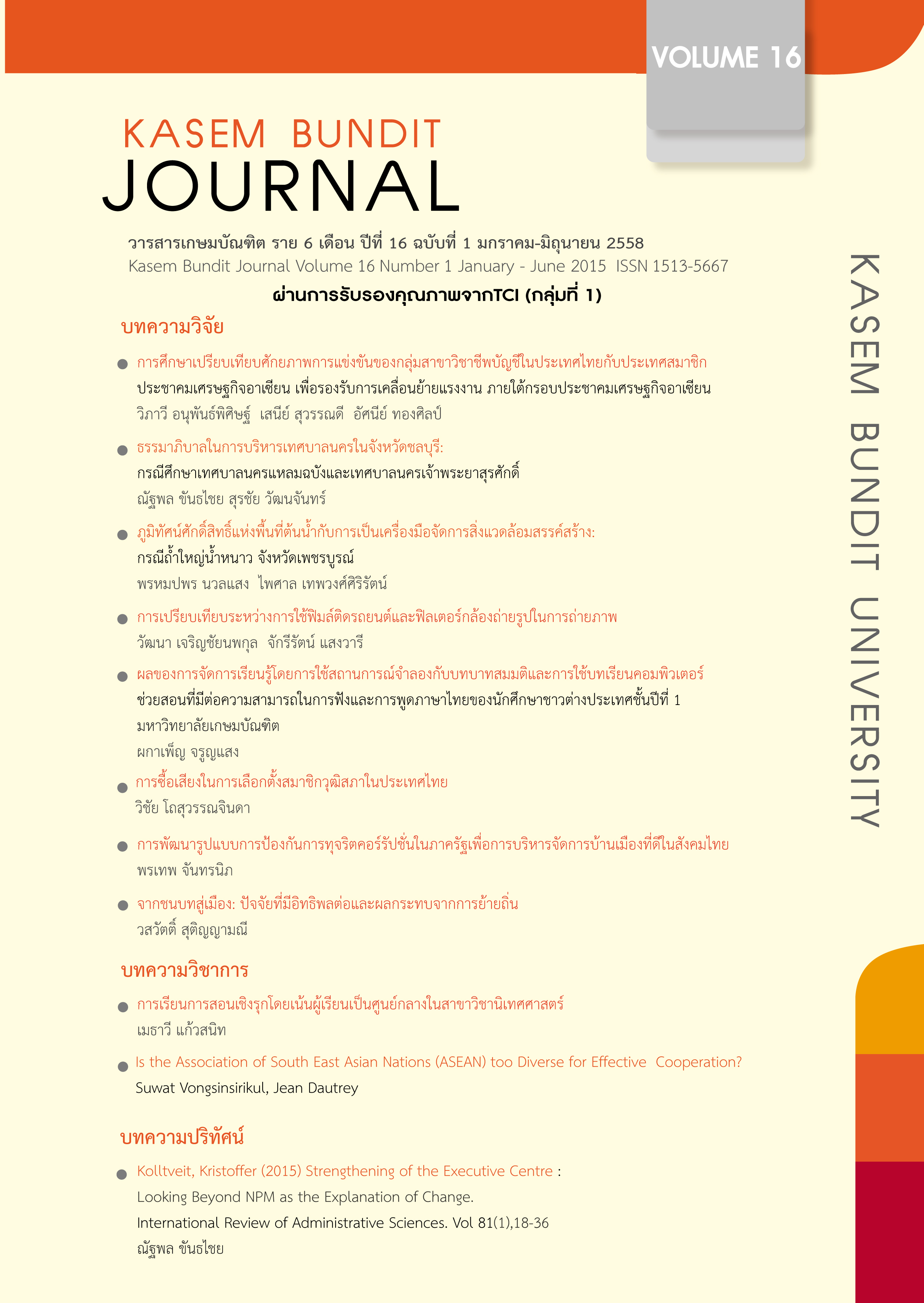การศึกษาเปรียบเทียบศักยภาพการแข่งขันของกลุ่มสาขาวิชาชีพบัญชีในประเทศไทย กับประเทศสมาชิกประชาคมเศรษฐกิจอาเซียน เพื่อรองรับการเคลื่อนย้ายแรงงานภายใต้กรอบประชาคมเศรษฐกิจอาเซียน
Keywords:
คำสำคัญ, การเคลื่อนย้ายแรงงาน สาขาวิชาชีพบัญชี ประชาคมเศรษฐกิจอาเซียนAbstract
Abstract
This research used mixed methods of quantitative and qualitative research by means of interview schedules and questionnaires for data collection. The results were as follows:
Thailand had most accountants in the AEC. Graduates in accountancy had relatively high opportunity to work. With low unemployment rates, most accountants were capable to be book keepers, but not to be involved in critical analysis across disciplines, e.g., finance, investment, management and strategic planning. A few of them could become certified public auditors. There was a need to improve English language skill and accounting technology application. A comparative study of accountancy capacity among AEC member countries revealed that professional accountants in Thailand are strong in delicate and creative works, professionally mature and honest. Although wages and salaries were higher than those in Indonesia and CLMV countries, most Thai accountants were lacking English language skills. There were a good deal of accountants in the Philippines while Malaysia and Singapore began to face a shortage of skilled labour in this area. Migrants from the Philippines and Malaysia were the largest group who came to work in the business sector in Thailand at a low level of employment for about 50 percent in the labour market, with a base salary of about baht 15,000.- As far as wages and incomes were concerned, accountants in Singapore enjoyed the highest wages and incomes while those in Malaysia and Indonesia followed. Wage rates in Thailand, Brunei and Vietnam were approximately equal while those in Lao were the lowest. With respect to business, medium business needed most labuor employment of about 50 percent and accountants were ranked third in terms of proportion in the Thai labour market. Regarding the government, it was revealed that all AEC member countries provided accounting, auditing and bookkeeping services.
การวิจัยนี้ เป็นการผสานวิธีการวิจัยเชิงปริมาณและการวิจัยเชิงคุณภาพ โดยเก็บรวบรวมข้อมูลในระดับนโยบายของประเทศและกลุ่มวิชาชีพบัญชี ใช้แบบสัมภาษณ์ และแบบสอบถามในการเก็บรวบรวมข้อมูล สรุปผลการวิจัยได้ดังนี้
ประเทศไทยมีจำนวนนักบัญชีมากเป็นอันดับหนึ่งของประเทศในกลุ่ม AEC นักบัญชีจบใหม่มีโอกาสได้งานทำค่อนข้างทำสูง ปัญหาการว่างงานมีน้อย ศักยภาพของนักบัญชีส่วนใหญ่เป็นเพียงผู้ทำบัญชีเท่านั้น ไม่เน้นการคิดวิเคราะห์ข้ามศาสตร์อื่น เช่น การเงิน การลงทุน การบริหารจัดการ การวางแผนเชิงกลยุทธ์ มีเพียงส่วนน้อยที่สามารถเป็นผู้สอบบัญชี ต้องปรับปรุงภาษาอังกฤษและการใช้เทคโนโลยี ผลการศึกษาเปรียบเทียบศักยภาพของแรงงานวิชาชีพบัญชีของประเทศในกลุ่ม AEC ในด้านแรงงาน พบว่า แรงงานวิชาชีพไทยมีจุดเด่นด้านการทำงานที่ต้องอาศัยความละเอียด ความคิดสร้างสรรค์ มีความพร้อมด้านวิชาชีพมากที่สุด การปฏิบัติงานวิชาชีพด้วยความซื่อสัตย์สุจริต แต่ค่าจ้างแพงกว่าประเทศอินโดนีเซียและกลุ่มประเทศ CLMV และขาดทักษะด้านภาษาอังกฤษ ฟิลิปปินส์มีนักบัญชีจำนวนมาก มาเลเซียและสิงคโปร์เริ่มมีปัญหาขาดแคลนแรงงาน เชื้อชาติที่เข้ามาทำงานด้านธุรกิจในไทยมากที่สุด คือ ฟิลิปปินส์ และมาเลเซีย ส่วนใหญ่ตำแหน่งงานอยู่ระดับเริ่มต้น คิดเป็นร้อยละ 50 ในตลาดรวม ฐานเงินเดือน 15,000 บาท ค่าจ้างและรายได้เฉลี่ยประเทศสิงคโปร์สูงเป็นอันดับ 1 รองลงมาได้แก่ มาเลเซีย อินโดนีเซีย ทั้งนี้พบว่าค่าจ้างของประเทศไทย บรูไน และเวียดนามมีค่าจ้างเท่าเทียมกัน ลาวจ้างถูกที่สุด ในด้านผู้ประกอบการ พบว่าธุรกิจขนาดกลางมีความต้องการจ้างงานมากที่สุดร้อยละ 50 มีการจ้างงานนักบัญชีมากเป็นอันดับ 3 ของตลาดแรงงานไทย ในด้านรัฐบาล พบว่า ทุกประเทศให้บริการด้านบัญชี ตรวจสอบบัญชี และการจัดทำบัญชี
Downloads
How to Cite
Issue
Section
License
ทัศนคติ ความคิดเห็นใด ๆ ที่ปรากฏในวารสารเกษมบัณฑิตฉบับนี้เป็นของผู้เขียน โดยเฉพาะ มหาวิทยาลัยเกษมบัณฑิตและบรรณาธิการ ไม่จำเป็นต้องมีความเห็นพ้องด้วย







